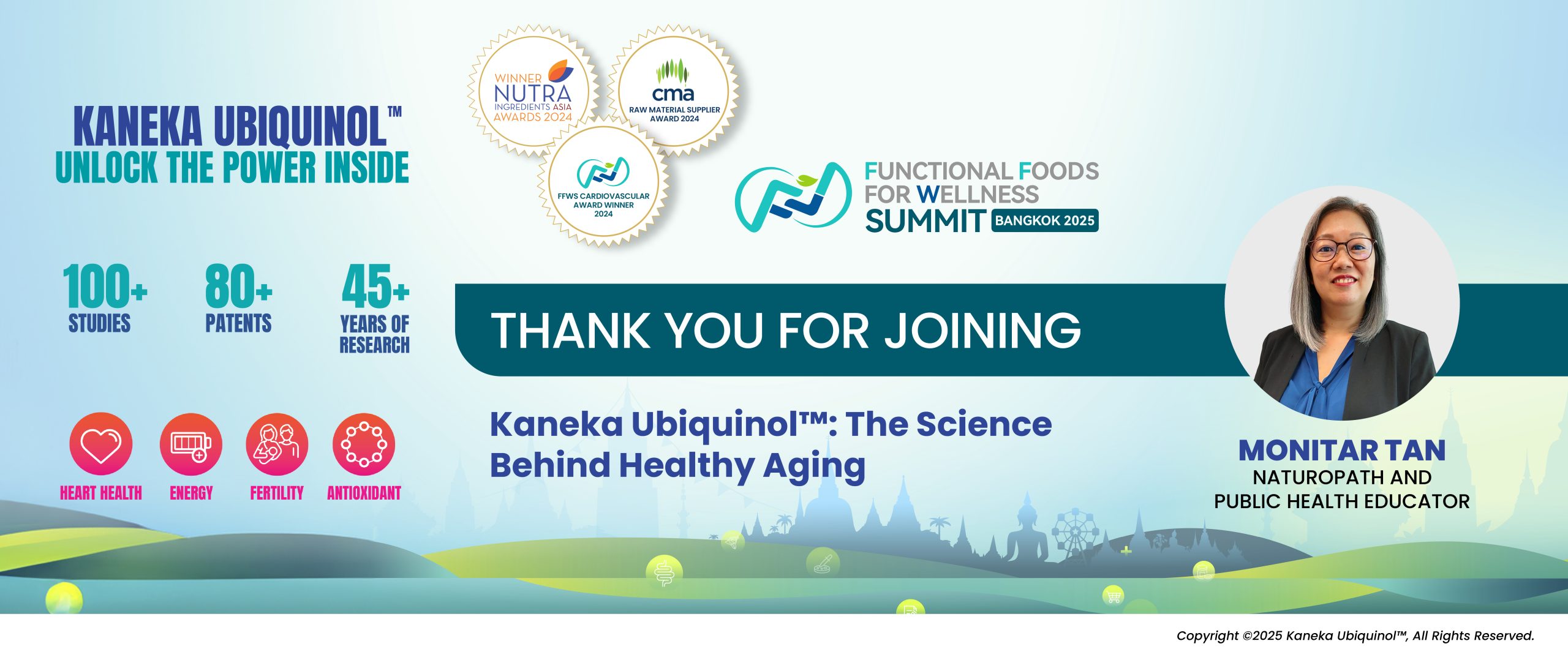
The keys to a healthy heart
Sep 2021Recent Article
Understanding the importance of our heart
Did you know that your heart beats on average 115 000 times a day?[1] If the heart is working so hard to keep us going every day, it only seems fair that we dedicate a World Day to this very important organ. Let 29 September (World Heart Day) be a reminder to all of us to connect with our own hearts and ensure that we know the keys to a healthy heart.
Around 1.2 million Australians have one or more heart or vascular conditions[2], with more than 4 million being affected by cardiovascular disease or CVD[3]. Understanding how our heart functions and needs can help us make some lifestyle changes to support our heart health in a better way.
Located in the middle of the chest, the heart is a muscular organ responsible for pumping over 2,000 gallons of blood through our blood vessels[4]. This blood provides the necessary oxygen and nutrients to all our organs, to work properly and keep up with all our daily routines.
The 4 keys to a healthy heart
Keeping our heart healthy is something we can work on every day regardless of what stage we are at in our health journey, including regular checkups, movement and healthy eating habits.
Get a heart health check
It is recommended to see a doctor for a heart health check if we are 45 years or older[5]. During this checkup, the doctor will assess the heart disease risk factors and will be able to advise on the next steps to improve our heart health or keep doing what we are doing right.
Don’t stop moving
Doing 30 minutes of moderate-intensity physical activity daily, like walking, can be great for our health [6]. Regular exercise helps us maintain a good cardiovascular health, by lowering our blood pressure and regulating our cholesterol and sugar levels[7].
The secret to this is to choose activities you enjoy. When you enjoy being active, you’re more likely to do it more often and supporting your heart health.
Start a heart-healthy diet
While we usually tend to eat healthy to look good, the importance of what we eat for our heart health can be a game changer. A heart friendly diet is one that is filled with a large variety of fruits and vegetables, whole grains, nuts, fish, poultry, and vegetable oils[8]. It is also recommended to limit the red meat intake to 1-3 times a week and also lower the consumption of unhealthy fats, salt and added sugar[9].
Get the right supplementation
Ubiquinol, the active (more readily absorbed) form of CoQ10, is a powerful antioxidant found naturally in the body. Ubiquinol has been shown to improve heart function by maintaining healthy levels of LDL Cholesterol as well as the overall maintenance of a healthy cardiovascular system.
However, our Ubiquinol levels start decreasing as we age. By the age of 80, they may decrease by up to 65%[10].
Our heart is one of the organs that requires the highest concentration of CoQ10 to pump blood in our bodies. However, CoQ10 needs to be reduced to Ubiquinol to completely show its antioxidative function that could help our cardiac cells reach their daily energy demands and potentially enhance hearth health and function[11]. Taking Ubiquinol in supplement form may help achieve the recommended daily dose.
Always read the label. Use only as directed. If symptoms persist consult your healthcare professional.
[1] Wojcik, S. and Kang, S., 2021. Basic Anatomy of the Heart – Health Encyclopedia – University of Rochester Medical Center. [online] Urmc.rochester.edu. Available at: <https://www.urmc.rochester.edu/encyclopedia/content.aspx?contenttypeid=85&contentid=P00192> [Accessed 20 September 2021].
[2] Australian Government Department of Health. 2021. What we’re doing about cardiovascular conditions. [online] Available at: <https://www.health.gov.au/health-topics/chronic-conditions/what-were-doing-about-chronic-conditions/what-were-doing-about-cardiovascular-conditions> [Accessed 8 September 2021].
[3] Heartfoundation.org.au. 2021. Key Statistics: Cardiovascular Disease | The Heart Foundation. [online] Available at: <https://www.heartfoundation.org.au/activities-finding-or-opinion/key-stats-cardiovascular-disease> [Accessed 8 September 2021].
[4] Healthdirect.gov.au. 2021. Circulatory system. [online] Available at: <https://www.healthdirect.gov.au/circulatory-system> [Accessed 8 September 2021].
[5] Heartfoundation.org.au. 2021. Keeping your heart healthy | The Heart Foundation. [online] Available at: <https://www.heartfoundation.org.au/heart-health-education/keeping-your-heart-healthy> [Accessed 8 September 2021].
[6] Heartfoundation.org.au. 2021. Keeping your heart healthy | The Heart Foundation. [online] Available at: <https://www.heartfoundation.org.au/heart-health-education/keeping-your-heart-healthy> [Accessed 9 September 2021].
[7] Harvard Health. 2021. The many ways exercise helps your heart – Harvard Health. [online] Available at: <https://www.health.harvard.edu/heart-health/the-many-ways-exercise-helps-your-heart> [Accessed 9 September 2021].
[8] The Nutrition Source. 2021. Preventing Heart Disease. [online] Available at: <https://www.hsph.harvard.edu/nutritionsource/disease-prevention/cardiovascular-disease/preventing-cvd/> [Accessed 8 September 2021].
[9] Betterhealth.vic.gov.au. 2021. Heart disease – know your risk – Better Health Channel. [online] Available at: <https://www.betterhealth.vic.gov.au/health/conditionsandtreatments/heart-disease-risk-factors> [Accessed 8 September 2021].
[10] Barcelos, Isabella P.d., and Richard H. Haas 2019. “CoQ10 and Aging” Biology 8, no. 2: 28. https://doi.org/10.3390/biology8020028
[11] Sharma, A., Fonarow, G., Butler, J., Ezekowitz, J. and Felker, G., 2016. Coenzyme Q10 and Heart Failure. Circulation: Heart Failure, 9(4), p.e002639.
You can share this by:
Keep up-to-date with Ubiquinol News
Ubiquinol Headlines
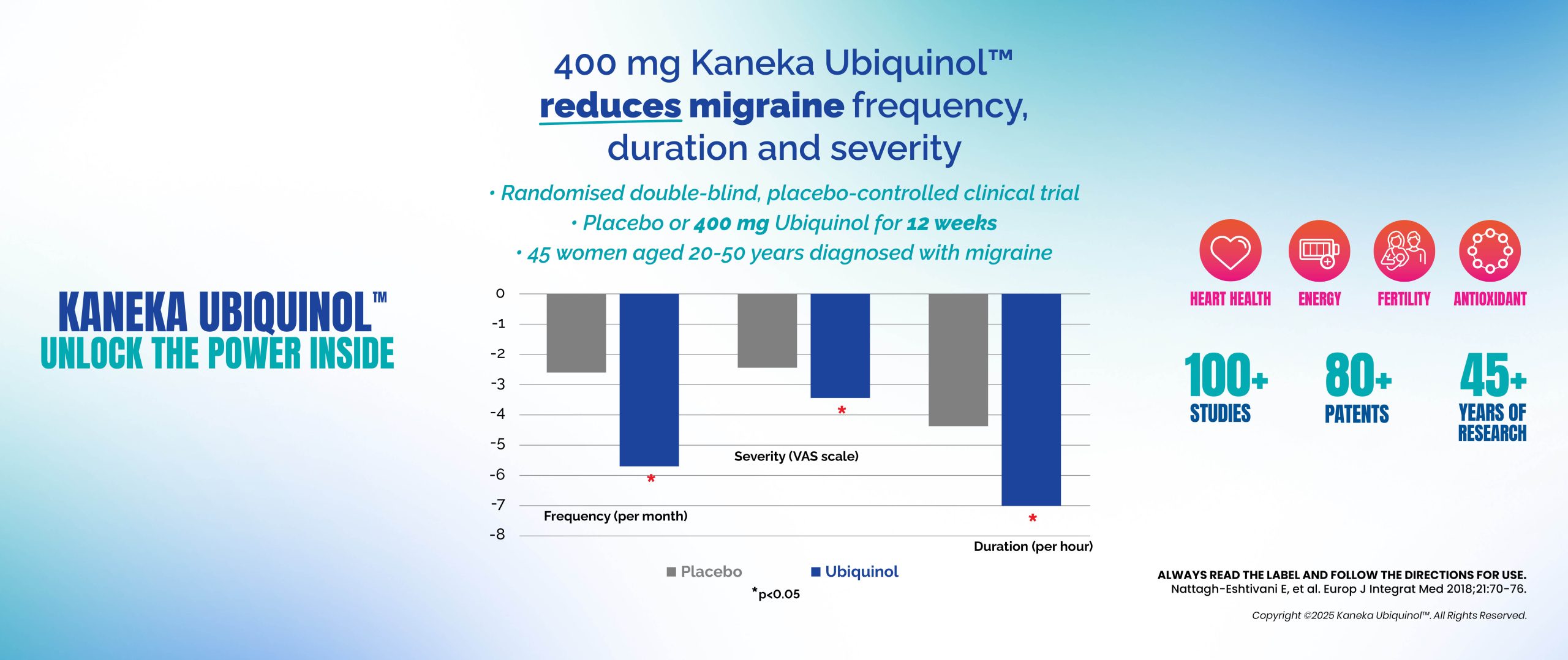
Ubiquinol: Supporting Migraine Relief Through Cellular Energy
Jan 2025Category: Antioxidants, complementary medicine, Energy, Fatigue, Health, Health Industry, healthy ageing, Kaneka, Mitochondrial health, Nutrition, Stress, Ubiquinol, Vitamins, wellnessRead More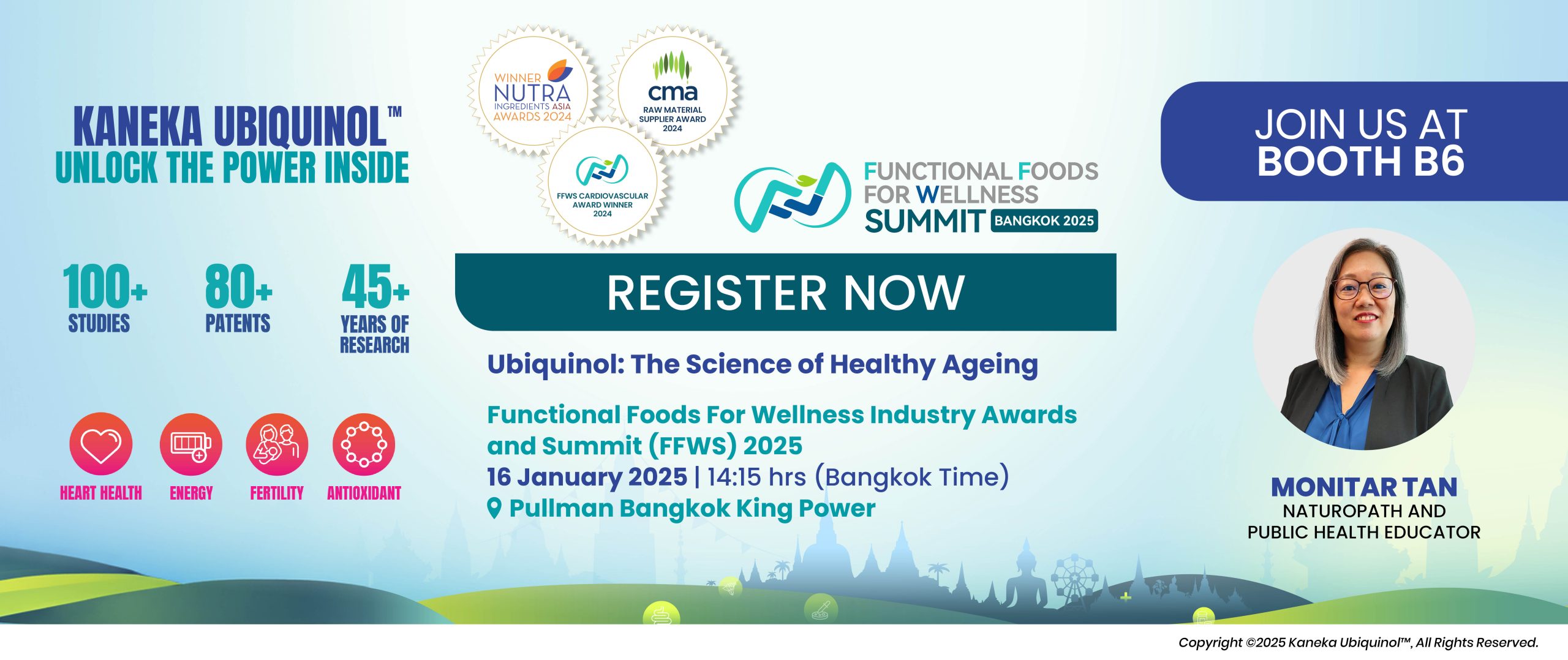
Kaneka Ubiquinol™ at Functional Foods for Wellness Industry Awards and Summit, #FFWS2025
Jan 2025Category: Ageing, Antioxidants, Awards, cardiovascular health, Conference, Conferences, Energy, Fatigue, FFWS2025, Health, Health Industry, healthy ageing, Kaneka, Menopause, Mitochondrial health, Nutrition, Ubiquinol, VitaminsRead More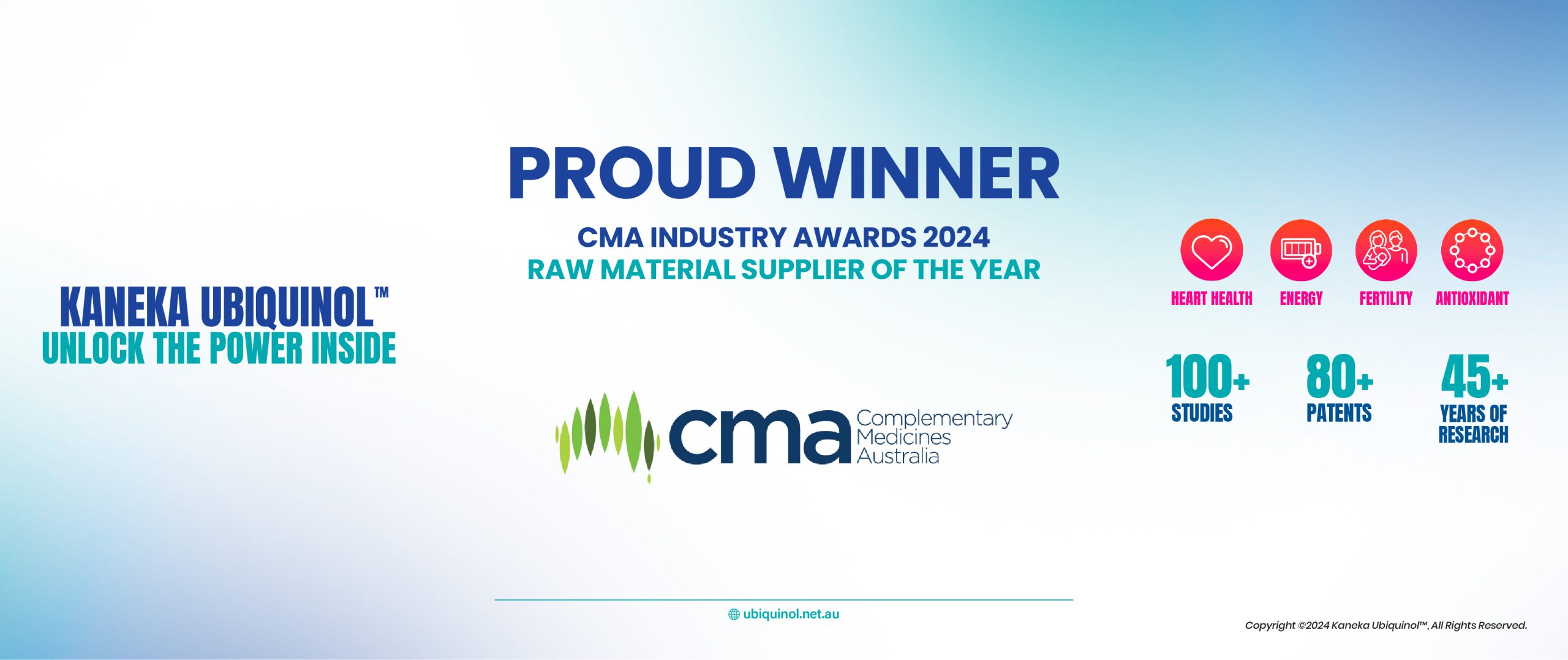
Kaneka Ubiquinol Wins Prestigious Complementary Medicines Raw Material Supplier of the Year Award 2024
Dec 2024Category: Ageing, Awards, cardiovascular health, complementary medicine, Conference, Conferences, Endurance, Energy, Fatigue, Fertility, Fitness, Health, Health Industry, healthy ageing, Heart, Immunity, In The News, Kaneka, Lungs, Memory, Mitochondrial health, Nutrition, Online, Stress, Ubiquinol, Vitamins, wellnessRead More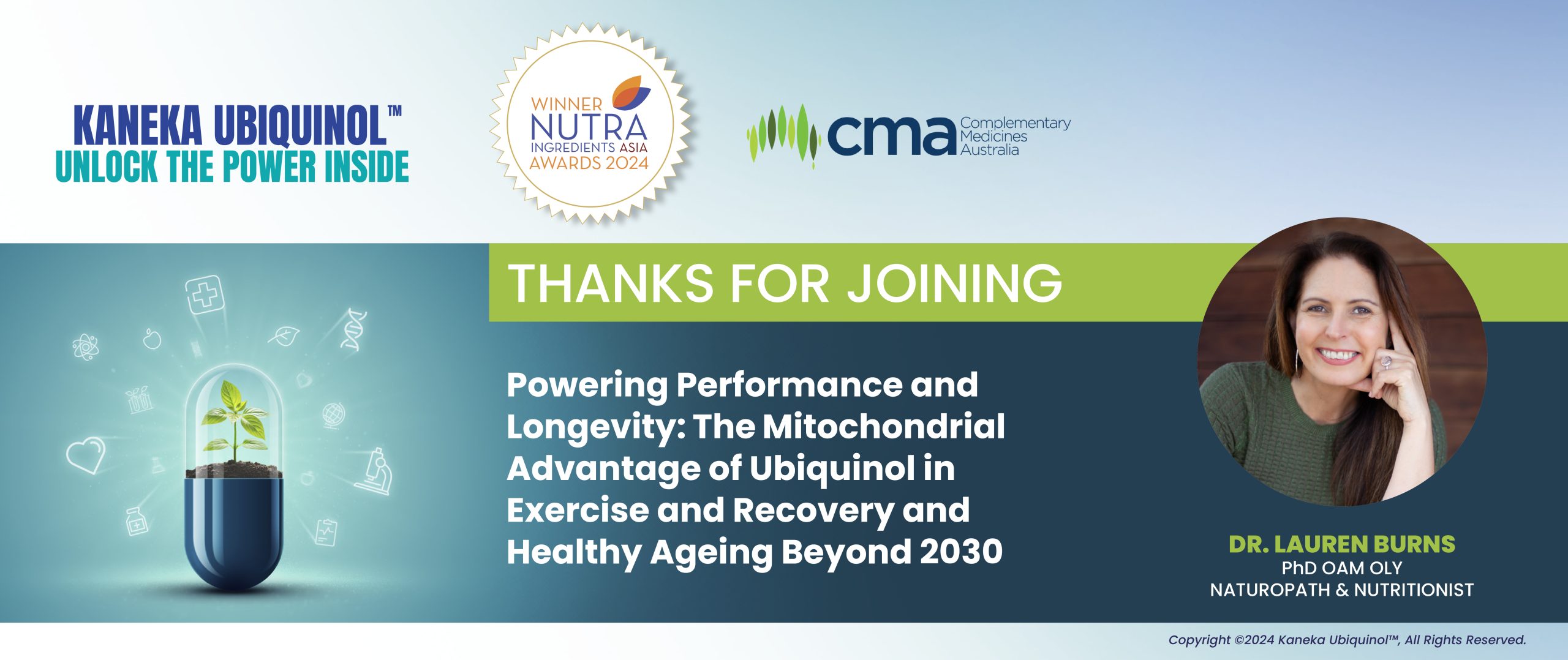
“Powering Performance and Longevity: Kaneka Ubiquinol™ at the CMA Annual Conference 2024”
Nov 2024Category: Ageing, Antioxidants, Awards, cardiovascular health, chronic fatigue syndrome, complementary medicine, Conference, Conferences, Endurance, Energy, Fatigue, Fertility, Fitness, Health, Health Industry, healthy ageing, Heart, In The News, Kaneka, Mitochondrial health, Online, Ubiquinol, VitaminsRead More
Natural Health Product Innovation Expo 2024
Nov 2024Category: Ageing, Antioxidants, cardiovascular health, Cholesterol, chronic fatigue syndrome, Conference, Conferences, Endurance, Energy, Fatigue, Fertility, Fitness, Health, Health Industry, healthy ageing, Heart, Kaneka, Menopause, Mitochondrial health, NHNZ, Nutrition, Stress, Ubiquinol, Vitamins, wellnessRead More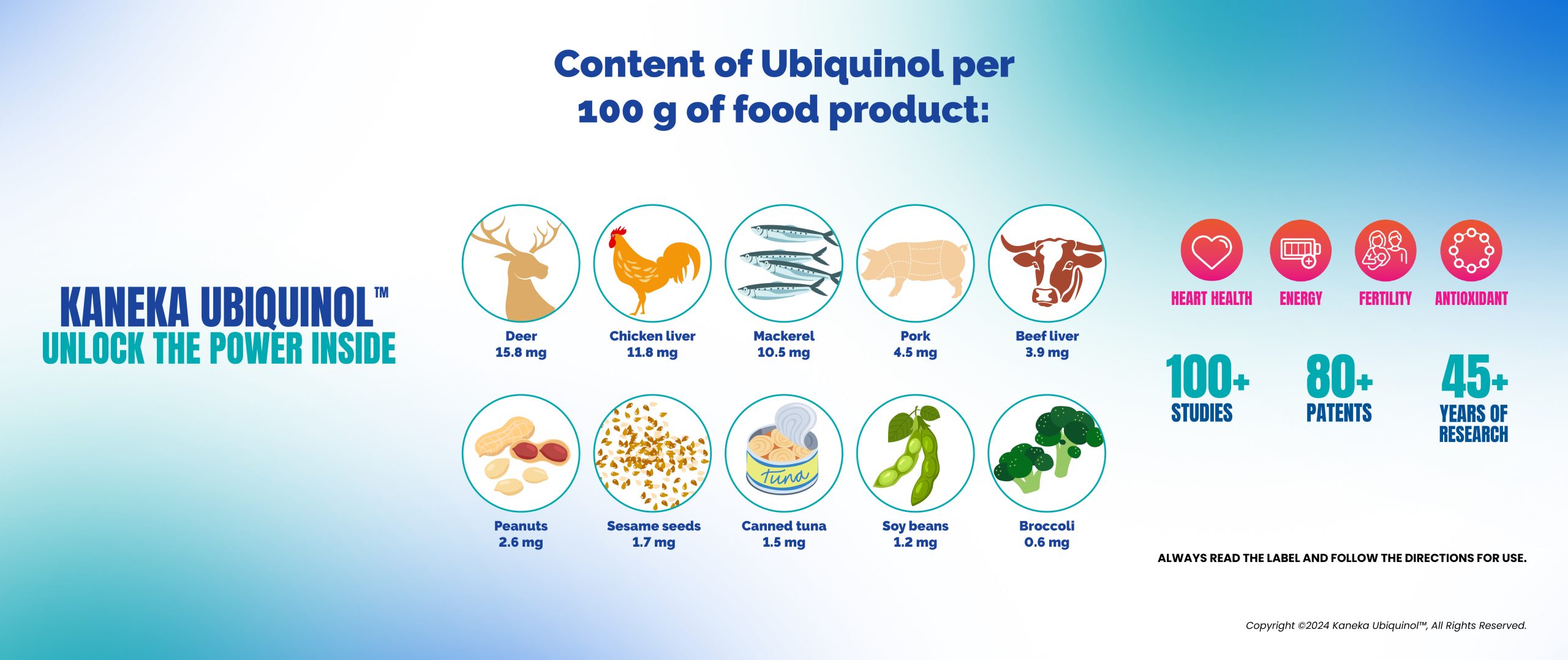
Ubiquinol: The Overlooked Nutrient for Vegans and Vegetarians
Oct 2024Category: Ageing, Antioxidants, Cholesterol, complementary medicine, Endurance, Energy, Fatigue, Fitness, Health, Health Industry, healthy ageing, Heart, Mitochondrial health, Nutrition, Stress, Ubiquinol, vitafoods, Vitamins, wellnessRead More
Investigating the Application of Ubiquinol in Mitochondrial Function
Oct 2024Category: Ageing, Antioxidants, cardiovascular health, Cholesterol, chronic fatigue syndrome, Endurance, Energy, Fatigue, Fertility, Fitness, Flu, Health, Health Industry, healthy ageing, Heart, Immunity, In The News, Kaneka, long covid, Lungs, Memory, Menopause, Mitochondrial health, myalgic encephalomyelitis, Nutrition, post pandemic, Stress, Ubiquinol, Vitamins, wellnessRead More


